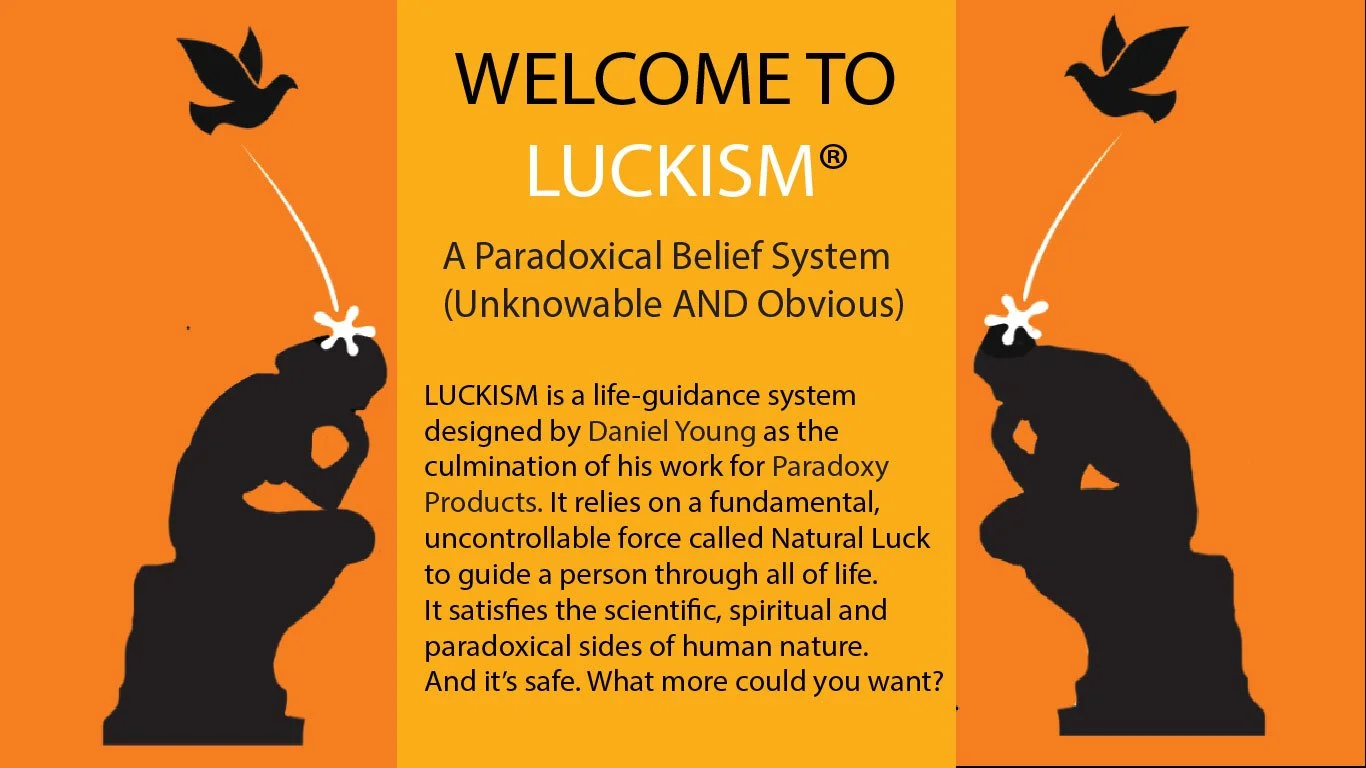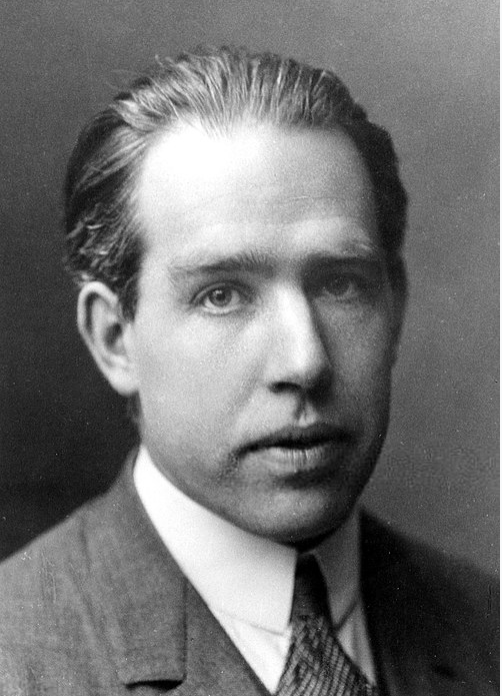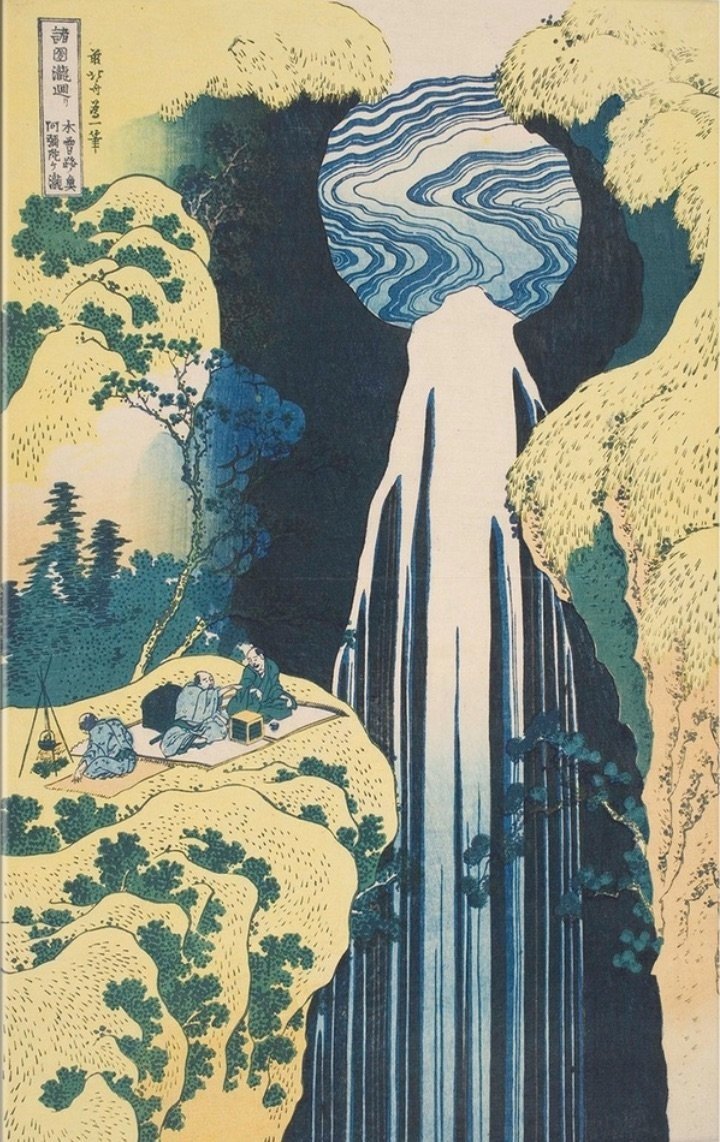Always Under Development (and Always Interesting)
SCROLLOVER: The Thinker by Auguste Rodin (1840-1917) is silhouetted, gender-extended and, with the help of a bird, used to illustrate the universal impact of Natural Luck on humanity.
Luckism In A Logo
™
The Luckism® logo combines the question mark and the Yin-Yang (Tao Chi) symbol. The logo represents the powerful uncertainty that is part of everything that exists or happens in the natural world. That fundamental force, which we call Natural Luck, is the focus of a designed system that is the functional equivalent of an ideal religion. It sustains, enhances and guides human activity without justifying violence or causing harm. We call this system Luckism.
WELCOME TO LUCKISM
THE HARMLESS BELIEF SYSTEM
You can call Luckism a philosophy, a way of life, a quasi-religion or even just an attitude. The important thing is that it is demonstrably true, paradoxically numinous and self-limiting. It is a complete belief system, capable of guiding you through all the situations of life with strength, wisdom and graceful modesty.
To learn more you can scroll down to review the extensive proof of the existence of Natural Luck from Science, from Traditional Wisdom or from Everyday Experience. OR, you can take a short quiz to find out how close you presently are to Natural Luck OR you can proceed to the specifics of how to apply Luckism to your life. [Add link.]
Art can sometimes come close to expressing the inexpressible. Here is a powerful print by Katsushika Hokusai (1760 - 1849) which we think illustrates Luckism’s idea that nature is full of the unknowable, unpredictable and uncontrollable force we call Natural Luck.
NATURAL LUCK IS REAL
SCIENCE
The famous Flammarion Engraving illustrates the human desire to “look behind the curtain.” Science is now proving that not all curtains can be lifted and many times only chance probabilities (otherwise known as “luck”) can give an answer. [Learn More]
Kurt Gödel (1906-1978)
Although Charles Darwin (1809 - 1882) was unaware of genes and the unpredictable results of their combinations and mutations he did recognize that chance was playing a number of roles in his theory of evolution.
EPICURUS (341-270 BC)
SCROLLOVER: Roman bust. Corneae added by Daniel Young.
An engraving by Otto van Veen (1660) illustrates the idea of a god in negative terms, “Quod oculus non vidit, nec auris audivit” (from the Vulgate, the principal Latin version of the Bible used in Christianity), "What no eye has seen, nor ear heard." (1 Corinthians 2:9).
In Hinduism, Brahman is the ultimate reality. The Brihadaranyaka Upanishad, describes Brahman as “neti, neti,” ("not this, not this") in its attempt to convey the idea that the ultimate reality, Brahman, transcends all descriptions and attributes. The Sanskrit OM symbol serves as a sonic representation of that idea.
WISDOM
This painting of Lao Tse by Zhang Lu (1464-1538) (modified with a speech bubble and the Luckism bird) represents Daoism and the many ways of ancient wisdom which posit an unknowable fundamental factor in the universe, such as the unnameable Dao, the Hindu “Neti Neti”(not this, not that) and Epicureanism’s Swerve. We call it luck. [Learn More]
EVERYDAY
EXPERIENCE
In a profound and hilarious mock book review Stanisław Lem (1921-2006) demonstrated the omnipresence of luck in everyday life by tracing back, over millions of years, some of the chancy events which led to the birth of a fictional professor. {Learn More}
In a revealing interview Kurt Vonnegut (1922 - 2007) recounted the many small but significant ways he chose to live close to what we call Natural Luck. [Learn More]
When Daniel Young (1941- ), the designer of Luckism, looks back on his life he is impressed by the extent to which luck was involved in it, from his birth through many chancy points when, through no particular merit on his part, he stumbled into innovations. "It is self-evident"says Young, “that luck is found in abundance when anyone examines their life with honesty and objectivity.”
Natural Luck includes bad luck and Luckism helps you deal with it.
BB King: Bad Luck Blues [Link to audio]
Well, my bad luck is falling
Falling down like rain
Bad luck is falling
Falling down like rain
No matter what I do
Seems like my luck won't never change.
Check Your Proximity to Natural Luck
If, like most people, you already believe in the reality of luck you are in the perfect position to learn how that can lead to a major step forward in your life. Here are a few questions to help you find out where you stand in relationship to what Luckism considers the most important kind of luck, Natural Luck.
NATURAL LUCK QUIZ
1. To what extent do you think that luck has played a significant role in your life? a) 80-100%, b) 60-80%, c)40-60, d)20-40%, e)0-20%
2. How comfortable would you be in a place where there is no Wi-Fi or cellular service for a week? a) Very comfortable, b) Somewhat comfortable, c) Uncomfortable, d) Very uncomfortable.
3. How often do you find yourself comparing your life to others based on what you see on social media? a) Rarely or never, b) Sometimes, c) Often, d) Very often
4. How often do you engage in activities that require direct interaction with physical objects (e.g., cooking from scratch, crafting, building, repairing)? a) Yes, frequently, b) Yes, occasionally, c) Rarely, d) Never
5. How much of your time is spent watching screens (TV, computer, phone)?, a) Very little (less than 1 hour/day), b) A moderate amount (1-2 hours/day), c) A significant amount (3-6 hours/day), d) A large amount (6+ hours/day)
6. How often do you walk or cycle instead of driving or using ride-sharing apps or public transportation? a) Most of the time, b) Frequently, c) Occasionally, d) Rarely or never
7. Do you prefer to read physical books/newspapers or digital versions? a) Primarily physical, b) A mix of both, c) Primarily digital, d) I don't read much
8. Do you have indoor plants or a garden you actively tend to? a) Yes, extensively, b) Yes, a few, c) No, but I'd like to, d) No, and I have no interest
9. When you encounter a problem or need information, what is your first step? a) To think about it, b) To ask someone in person, c) To search online, d) To use an app or specific software
10. What proportion of your diet consists of unprocessed or minimally processed foods (e.g., fresh fruits, vegetables, whole grains)? a) 75% or more, b) 50-75%, c) 25-50%, d) Less than 25%
11. How much of your daily communication with other people is typically face-to-face (without electronic devices)? a) Most of it (75% or more), b) A significant portion (25-75%) c) A small portion, (less than 25%), d) Almost none
12. How often do you consciously disconnect from digital devices for extended periods (e.g., a full day, a weekend)? a) Regularly (at least once a week), b) Occasionally (a few times a month), c) Rarely, d) Never
13. When you feel the need to relax, what is your go-to activity? a) Spending time in nature (e.g., walking, gardening) b) Engaging with technology (e.g., social media, games, streaming), c) Reading a physical book or magazine, d) Socializing in person
14. On average, how many hours per day do you spend outdoors in a natural setting (e.g., park, garden, wilderness)? a) 3+ hours, b) 1-3 hours, c) Less than 1 hour, d) Rarely/Never
15. How much of your shopping is done on the internet (by monetary value)? a) Most of it (75% or more), b) A significant portion (25-75%), c) A small portion (less than 25%), d) Almost none
16. How often do you walk or cycle instead of driving or using ride-sharing apps or public transportation? a) Most of the time, b) Frequently, c) Occasionally, d) Rarely or never
17. To what extent, if any, will you use Artificial Intelligence to make major decisions in your life? (Education, career, marriage/partnership, friendship, business) ? a) As the primary authority, b) As an expert opinion, c) as a stimulus to my thought, d) not at all
18. What is your opinion on the goal of human colonization of Mars? a) strongly support, b) support, c) neutral, d) oppose, e) strongly oppose
19. What is your usual source of drinking water? a) stream, river, lake, b) cistern, well, c) piped from reservoir, d) trucked or bottled
20. If a food contains ingredients that have been genetically manipulated, is that a consideration in your decision as to whether to use it? a) Decisive, b) A factor, c) Of some interest, d) Unimportant
STARTING WITH WATER
AND OTHER BASIC NEEDS
Water, the amazing natural substance on which all forms of life depend, is an ideal starting point for showing how the respect for Natural Luck at the core of Luckism® leads logically and inevitably to rules for living.
First comes the understanding that water is the epitome of something that contains Natural Luck. It’s origin, physical structure, and functions have much in them that is beyond our understanding and is likely to remain so. [Learn More]
Luckism® shows its reverence for the Natural Luck in water by obeying simple rule of behavior. Get it as directly as possible. Don’t harm it. Don’t misuse it. Don’t waste it. In practice this will lead to a wide range of changes, from your attitude towards soda to your opinion of the Panama Canal. Puzzled? It’s all connected. [Learn More] [and/or scroll overs for soda and Panama Canal.
The same spirit of reverence and rules of directness and proper use will show you how to deal with all the processes and products of modern life.
It will be found that many of the good causes which we pursue for reasons of justice, fairness or logic have a common, underlying spiritual basis in Luckism®. They arise from a basic need to live in conformity to our deepest understanding of what are the fundamental rules of the natural world. If a person can honestly believe the foundational facts of Luckism® then this design is the beginning of the unending process of trying to apply that understanding to life on Earth.
C. HOW DOES IT WORK?
1. Short summary of life applications of LUCKISM®
2. Link to page of specific subjects (with illustrations):
a. Food and water
b. Relationships
1. Family
2. Friends
3. Work
c. Transactions/ interactions
d. Life and Death Matters
e. Science & Technology
f. Government
g. Economics
D. WHO DESIGNED LUCKISM®?
E. HOW CAN YOU ADD LUCKISM® TO YOUR LIFE?
1. Apply it to your life. (Following the topics of C2)
a. Examples
2. Practice its “rituals” solo or communal
a. Sublimated gambling
b. Aleatory analysis
c. Chance guidance
F. JOIN AND SUPPORT
LL.
LUCKISM APPEAL FOR DONATIONS
Daniel Young, the designer of Luckism®, inserted dice
into powerful images of creator gods by William Blake and Michelangelo.
For god-worshippers this visualizes the centrality of chance in the universe.
Blake’s Original
Plus Milton Glaser’s “Celebrer La Terre,” a masterful conflation of an earthly landscape and the Milky Way to celebrate a minuscule planet Earth while encouraging human modesty.
And Stephen Hawking’s witty comment on a famous Einstein statement.
NOURISHMENT
Obtaining food and drink directly from an original, natural source will always involve you in more of what is unknowable and unpredictable, closer to natural energy. This puts you in touch with natural luck, both in the form of the nourishment itself and the transaction/interaction by which you get it.
. (at this point include all graphics and text from WHAT IS NATURAL LUCK? PAGE.
A FEW GIGANTIC SMALL EXAMPLES
FOOD AND DRINK - Obtaining food and drink directly from an original source will always involve you in more of what is unknowable and unpredictable, closer to natural energy. This puts you in touch with natural luck, both in the form of the nourishment itself and the transaction by which you get it. (Water is most desirable from the body of water, the well or the reservoir via the faucet. Food is more desirable from the farmer or the cook.) LUCKISM® consists of applying this ideal in all areas of life. For a fuller explanation of food rules, See Here.
Preferring direct interactions and communications with other living things as opposed to using intermediary devices.
Walking rather than using machines.
Applying science to matters arising on Earth and not to outer space.
LUCKISM® LIVES IN REAL SPACE AND REAL TIME
LUCKISM® does not want to explore or occupy outer space. That region is lacking in the natural luck in which we exist on Earth. There is more than enough for science to do on this planet. LUCKISM® does not concern itself with the inconceivably remote times of cosmic creation or the death of the universe. It gives its attention to the time of our here and now. on Earth. That’s big enough.
Yes, following LUCKISM® will change your life. It will probably slow things down. Yes, you will “accomplish” fewer things in a day. That is one of the benefits! The time you may initially think you are “wasting” is true life-energy restoration time, life-enhancement time, life-expansion time. LUCKISM® is in tune with what life should be. LIFE IS NOT MAXI-TASKING. LIFE IS NOT LIVING INDIRECTLY. LIVING IS NOT JUMPING AROUND!
LUCKISM® says, “Live near the waterfall, not within it.”
For example, the prohibition of water as a routine commercial product, transported over long distances involves corporations and the larger question of relations between consumers and the products of those artificial economic entities. Water as used for purposes of marine transportation has to be examined. The use of more than 50 million gallons of fresh water to move a single ship through the Panama Canal comes into question. This connects to the subject of what those ships are carrying. Wouldn’t it be ironic if they were carrying bottles of water or soda?
Water provides a good example of how LUCKISM® finds beneficial rules for human conduct by focusing on our relationship to natural luck. Water is the most important natural substance. It is involved in the emergence of life and the sustenance of life. It is full of unknown and unknowable aspects of origin, form and function. Stated succinctly, water embodies natural luck and is deserving of sacred status.
It follows in LUCKISM® that water should be obtained as directly as possible from its source and should not be polluted, misused or wasted. This leads to the rejection of commercially bottled or packaged water except for use in emergencies. It also avoids flavored and carbonated water products which waste large amounts of water to produce a lesser amount of liquid product.
LUCKISM® advocates the end of the use of water to remove human waste. The time will come when people will look on our use of water to remove waste with disbelief and disgust.
In LUCKISM® simple starting points like seeking direct sources for our water needs and eliminating soda from the human diet connect to a wide range of behavioral modifications.
This approach exemplifies the attitude with which LUCKISM® approaches all the natural necessities of life and all the basic interactions in life. It is all done with the idea of achieving proximity to the operation of natural luck as a revered source of life energy.
Water, the amazing substance on which our lives depend, is a good first example of how Luckism® applies to life.
Water is full of natural luck, namely, aspects of it’s origin, physical nature and function which are beyond our understanding and are likely to remain so. Water is a basic example of how life depends on a mix of understandable order and unknowable chance. This characterizes all things and processes in the universe. In the flush of pride over our ability to apply our intelligence to achieving some degree of control over the natural world we have lost respect for the vast extent over which uncontrollable chance rules.
Against that background Luckism® works to offer humanity a way to achieve a healthy balance. This means that we try to live in the zone where natural luck give energy to life but we do not seek the level of control and domination which, aside from being impossible, is a source of harm and destruction. In simple terms this translates into choosing water rather than soda. We move on from there to the “ten thousand things” which fill the world and compete for our attention and devotion.
Obtaining water as directly as possible from its natural source maximizes the natural luck with which it is associated. Getting water indirectly, as transported, processed, packaged and commercialized reduces the benefits. Wasting water and misusing it is sacrilege.
The common-sense way that Luckism® develops rules regarding water is a model for how LUCKISM® approaches all things in life.
Following Luckism® means paying close attention to how we affect natural luck in all aspects of life, in the materials we use, in the work we do, in the relationships have, in the transactions in which we engage and in the goals we set. This attention starts with our personal lives and extends to our behavior with respect to the larger entities to which we are connected, social and political communities, economic groups and religions.
It will be found that many of the good causes which we pursue for reasons of justice, fairness or logic have a preemptive spiritual basis in Luckism®. They arise from a basic need to live in conformity to our deepest understanding of what are the fundamental rules of the natural world. Luckism® lays claim to such a position. If a person can honestly believe the foundational facts of Luckism® then this design is the beginning of the unending process of trying to apply that understanding to the world.
























